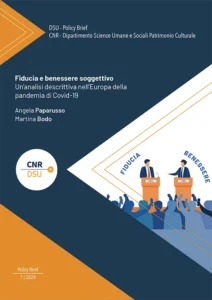
DSU Policy Brief 7-24
Fiducia e benessere soggettivo
Un’analisi descrittiva nell’Europa della pandemia di Covid-19
Angela Paparusso; Martina Bodo
DOI: 10.36134/PBDSU-2024-7 Download as .PDF file
What factors help sustain trust in institutions, science, and the media (so-called vertical trust), as well as the subjective well-being of the population?
In this Policy Brief, we aim to answer this question by analyzing individual data from the Eurofound Living, Working and COVID-19 survey and examining the relationship between vertical trust and life satisfaction among European citizens during a period of economic and health uncertainty.
During the COVID-19 pandemic, European citizens showed a relatively high level of trust in science and institutions, whilst placing less trust in the media. Additionally, respondents’ level of education, employment status, and self-perceived health played an important role in shaping vertical trust. Finally, European citizens considered themselves fairly satisfied with their lives: specifically, men, young people, as well as the elderly, university graduates, employed individuals, and those reporting very good health appeared to be more satisfied with their lives.
Overall, we believe that, especially during times of economic and health uncertainty, it is important to implement public policies aimed at increasing education levels, promoting employment, improving health, and enhancing gender equality within European households.
How to cite
Paparusso, A., & Bodo, M. (2024). Fiducia e benessere soggettivo. Un’analisi descrittiva nell’Europa della pandemia di Covid-19 (DSU Policy brief 7). CNR-Dipartimento di Scienze Umane e Sociali, Patrimonio culturale. https://doi.org/10.36134/PBDSU-2024-7.
Last updated: 1 October 2024

